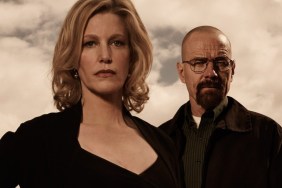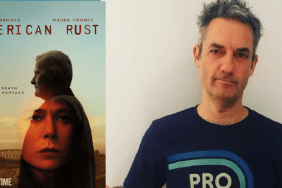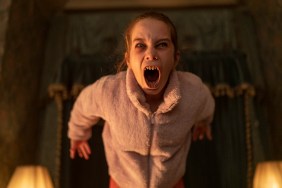Director Noam Murro and author Mark Poirier’s debut Smart People is an indie mix of comedy and drama that should appeal to fans of movies like Sideways and The Family Stone, and it’s no coincidence that like those movies, it’s produced by Michael London, who brought on two of the stars from his previous films. The trio also convinced Dennis Quaid to grow a beard and sports a gut to play Lawrence Wetherhold, an English professor at Carnegie-Mellon who is generally hated by his students and co-workers and whose life has been put on hold after the death of his wife years earlier. Along comes Sarah Jessica Parker as Dr. Janet Hartigan, a former disgruntled student who finds another side of the crotchety professor when they start getting closer, which is made more difficult by Lawrence’s slacker stepbrother Chuck, played by Thomas Haden Church, who has moved in with the family. The fourth part of the equation is Ellen Page as Lawrence’s daughter Vanessa, an over-achieving Young Republican trying to get away from the family tradition.
ComingSoon.net had a chance to sit down with the first three to talk about the movie. Something to know about the interviews you might read on ComingSoon.net, a few of them are done at press conferences or in this case, at a roundtable with a small group of journalists, and in this case, the three actors were “paired” so that we had to interview them as a group. There’s good and bad with that, the bad being that the actors tend to talk over each other or worse, try to “pass the buck” and let others answer questions, but if they get along, they play off each other well, which was the case with this motley trio, who one might never expect to make a movie together let alone sit in a room talking about it. Fortunately, Church livened things up, just as he does in the movie, stealing many scenes with everything he does or says.
ComingSoon.net: No more crazy moustache, was that real?
Thomas Haden Church: No, no, it was real, I grew it and that was the best I could get it.
CS: It was pretty amazing.
Dennis Quaid: His moustache? It was good, wasn’t it? (to Tom) What did you say? You wanted to look like… who was it you wanted to look like?
Church: Elliot Gould in “MASH,” that was my mark.
CS: And Dennis, you had a beard, what was that like?
Quaid: It was okay for a while, but I prefer not to have a beard.
CS: Can you talk about the other physical aspects from the beard to the walk, it seems like a lot is going on even before you speak? Can you talk about building the character physically?
Quaid: Yeah, I wanted him to have a look to him, very sedentary, someone who is sort of like a sleepwalker or somebody who is emotionally dead in a way and had been for quite some time. Unkempt. I didn’t have time to gain the weight so I just put on a fat suit every day, and actually, putting it on is like having the weight on. It’s hard on your back and it changes the way you walk, and the beard is really kind of a protective defense with him in a sense, to hide from the world, or to appear to be very smart.
CS: Were there any professors that influenced the character, maybe from your own time in college?
Quaid: No, not really. I really just went to the script. You know Mark (Poirier) wrote such a great script and drew such a great character just there, that was the great springboard for me.
CS: Mark and Noam (Murro, the director) mentioned that the project was in the works for a long time and that much of the delays came from finding Vanessa. Can you talk about how you found the script and working with Ellen Page before she became known?
Church: I spent a lot of time with Ellen when we were shooting the picture, and I was absolutely as impressed with her off-camera as anything we did in front of the camera. She’s self-possessed but in a positive way, beyond confidence, and she understands where she is in walking the earth. I just think it comes from excellent parenting, a real focus on academics when she was young she told me, and it was informed by nothing. Just one night we were shooting and she was talking about living in Toronto, and I knew she was from Nova Scotiashe was 19 when we shot the movie. I said, “Really, when did you live in Toronto?” and she said, “Well, I was emancipated and living alone when I was 15 living in Toronto going to school.” And I’m like, “That’s f**king great! I had a lawn-mowing business when I was 15.” (laughter) I mean, she was so focused, so young, and I had made comparisonseven though I don’t personally know him but I know people who know himto what I think Leonardo DiCaprio was probably like at that age or what Sarah Jessica PARKER! (turns to Parker sitting next to him when he says this loudly almost making her jump and causing laughter) was at that age when she was starring on BROADWAY! (and he does it again getting even louder) in ANNIE! (laughter) Nah, I’m really amazed and a little bewildered by that early focus, that laser intensity.

CS: Did her character change a lot from the script when she came on board as Vanessa?
Sarah Jessica Parker: I was only hired when they were about to start shooting, so I didn’t have the script for a long time and everybody had been cast, and this movie was made before “Juno” so there was just an idea, an inkling, about Ellen’s extraordinary skill, but I certainly knew both of their work. I had very little time with the script, which may have been just as well. I simply loved it and I had worked with Michael London, he produced “The Family Stone,” he just asked and I just said “Yes,” it was a great script, and he has really great taste. (to Dennis) You had the script for quite a while because you were the first to be cast?
Quaid: Michael (London) was on board already, but based on the script, I had a meeting with Noam, because I didn’t really feel like I was right for the role. I couldn’t understand why they wanted me for this role. It was so unlike anything I’d ever done. There were so many more obvious people that I thought they could and should go to, but I had a meeting with Noam here in New York, and we talked about everything but the script. I just found him to be so intriguing and I wanted to work with him.
CS: The movie poster is selling the movie with the three of you and Ellen Page as the four marquee names. Can you talk about the first time you realized that people might want to see a movie because you’re in it and what that felt like?
Quaid: I don’t know if that ever happened.
Parker: I’m not sure. Thomas Haden Church?
Church: I have no rejoinder. I guess I don’t look at it like that, although certainly, I was looking at the one sheet, you know like “Dennis Quaid, cool movie star for a long time, and Sarah Jessica Parker has this rabid cult following
”
Quaid: Yeah, only half the population.
Church: And Ellen is this ‘wünder-maiden’ and I’m saying that with all due humility, I’m kind of honored and flattered to be in that company, and I’m proud of the movie. It was a pretty small movie that we shot
by the time it comes out, it’s going to be like a year and a half ago, and even though Miramax picked it up right away based upon 10 minutes of footage that they saw over a year ago, these movies are still very difficult to market. I remember when “Little Miss Sunshine” was going around, and whenever I read it and I met with the directors and they were like “We can’t make the movie without you” and Steve Carell hadn’t broken, and it was just like I had already been cast in “Spider-Man 3” and you’re always like, “What’s going to happen? What’s going to happen?” And then suddenly, “Little Miss Sunshine” kind of inspired me a little bit, ’cause I really loved the script but you’re like “What’s going to happen?” because then it’s like “Oh, God, if it doesn’t get a distributor
” and then sometimes the quality of the picture, it has no reference point in history. It’s like, “It failed because nobody saw it.” That doesn’t make it a failure, and failed by whose abacus?
CS: Sarah, what’s the difference between working on a small independent film like this over a major production like “Sex and the City” where you’re not only acting but producing as well?
Quaid: Your trailer, for one thing. (laughter)
Parker: Well, sometimes the difference is what might seem like a disadvantage actually. I personally like we had a less than luxurious schedule on this movie. I think they said it was 29 days, and I actually do like that kind of speed. Big movies tend to have very generous schedules and generous budgets, and you end up doing things over three and four days that you know can be done in an afternoon or a day and a half, and you just think of all the money flying out the window and all the energy that dissipates over the day while you wait and then just producing responsibilities, ’cause both these gentleman know them well, they just change your responsibilities. They change your burden on the set. I love the burden of producing, I love it, but I’m one of eight kids, so it’s very much like the chaos of my life, but it’s also very nice to be a hired actor and to have no responsibilities. I like both very, very much, but I will say that I really like the schedule of a movie that has constraints on it financially because you just keep moving.
Church: Yeah, this is much better really.
Parker: And actually “Sex and the City’s” budget, compared to what we have to do over time, wouldn’t really amortize out to a really big budget relative to its partners in that, it’s actually pretty small compared to what was necessary.
CS: One of the things the director said was that you didn’t get a lot of rehearsal time with each other but you all prepared your characters on your own and then brought them to the set. Could you say something about the other that surprised you when you started shooting?
Parker: Um
I didn’t get very much time with him (referring to Church). He’s really really quick and he has a real gift for true improvisation not what’s tossed around today by those who don’t have the gift, but he really does. You witnessed it in the room and probably many other occasions, but he’s extremely fast and it’s very inspiring to try to keep up and I had just a tiny bit of time with him, and honestly, what I really loved about Dennisneither of that is surprising, it’s just very exciting to be aroundthe thing that’s surprising about Dennis is that he’s just been doing it for so long and he is so present and happy to be there, and he’s never dragging his feet, and he doesn’t seem like he’s punching in and doing perfunctory
he’s working on it and asking questions and this guy (again to Church) the same way, and I was just excited that at this point in his careerbecause I’ve been on sets with people who have been around as long and they’re simply not happy to be there anymore. It’s mercenary or it’s some kind of pressure. I was so happy to be around someone like himself, who really is working hard and cares, and it’s great.

CS: What do you all do in Pittsburgh when you’re not shooting a movie?
Quaid: I went to Steelers games.
Parker: There’s good food in Pittsburgh.
Quaid: Yeah, we really didn’t have a lot (of free time). Because we did this in 29 days, we wound up working sometimes 14 even 16-hour days on this and so we would basically go back to the hotel and crash until we had to get up the next day.
CS: Can you talk about how well you felt Carnegie-Mellon was portrayed and how did you get into the CMU culture?
Quaid: It wasn’t written to be Carnegie-Mellon.
Church: It was written to be Georgetown.
Quaid: Yeah, it was written to be Georgetown, and there was probably some budgetary things that restricted us from shooting there, as well as a number of other things, but we ended up at Carnegie-Mellon. I don’t think it really changed much except for being there. I think Carnegie-Mellon changed the script maybe in itself, not that we changed for that. It was a really great place to shoot, too. The campus is fantastic in a way. It’s unique.
Church: I didn’t know anything about Carnegie-Mellon, but what was really surprising, when it was Georgetown, Dennis’ character was regarded to be such a weary elitist and whenever we were in Pittsburgh, and like the local teamster drove me around, I became quite aware of the class distinction from kids that go to Pitt, kids go to some of the other schools and kids who go to CMU. It was quite evident being driven around by this blue collar teamster working class guy who had grown up his entire lifehe was in his 60slived, grew up, his whole life, raised kids, the whole thing in Pittsburgh, that it was regarded as the “rich kids’ school” and that was for me the bridge to Georgetown, because an actor who I know that went to De Paul, started at De Paul, but he said that all he wanted to do was go to Georgetown. He said, “My whole life was focused on being at Georgetown because it was such an elite academic environment.” I realized that there in Pittsburgh, that was what Carnegie-Mellon represented and that why I thought that transference was not that far from Georgetown.
CS: Can each of you talk about what you have coming up next?
Church: That’s coming out? I have a movie coming out in September with Sandra Bullock–and I don’t know what it’s going to be called in September–when we shot it, it was called “All About Steve.”
CS: Are you Steve?
Church: I am not Steve. An actor named Bradley Cooper is Steve.
Parker: Oh, I know Bradley! He’s sweet.
Church: That’s right! He was Jake the Smoker or something…
Parker: In “Failure to Launch”? Oh, he was on “Sex and the City” too, yeah!
Church: He was Jake the downtown smoker or something. (Yes, it seems that Church just outed himself as a “Sex and the City” viewer!)
Quaid: I have a movie called “The Express” coming out in competition with his film coming out in the fall.
Parker: It’s a smackdown.
Quaid: It’s actually coming out in October.
Church: And we’re still going to be clawing for theaters after the monstrous “Sex and the City” run throughout the summer. (laughter)
Parker: Oh, God!
CS: What can you tell us about that?
Parker: It’s coming out May 30. We’re working on it as we speak. Memorial Day weekend (it’s not), which is our standard date because the show used to premiere on the first week of June.
Quaid: It is the Super Bowl for women, isn’t it?
Parker: We’ll see.
Smart People opens nationwide on Friday, April 11. Check back next week for our exclusive interview with director Noam Burro and writer Mark Poirier.









